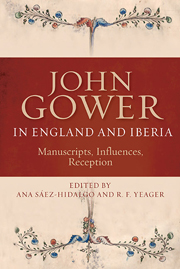Book contents
- Frontmatter
- Contents
- List of Illustrations
- Abbreviations
- Introduction
- I Manuscripts
- II Iberia
- III The Classical Tradition
- IV Economy
- V Reception
- 16 The Long and the Short of It: On Gower's Forms
- 17 “Al université de tout le monde”: Public Poetry, English and International
- 18 Buying Gower's Confessio Amantis in Modern Times
- 19 Gaps and Silences in the Reception of John Gower in Franco's Spain
- Notes on Contributors
- Bibliography
- Index
16 - The Long and the Short of It: On Gower's Forms
from V - Reception
Published online by Cambridge University Press: 05 August 2014
- Frontmatter
- Contents
- List of Illustrations
- Abbreviations
- Introduction
- I Manuscripts
- II Iberia
- III The Classical Tradition
- IV Economy
- V Reception
- 16 The Long and the Short of It: On Gower's Forms
- 17 “Al université de tout le monde”: Public Poetry, English and International
- 18 Buying Gower's Confessio Amantis in Modern Times
- 19 Gaps and Silences in the Reception of John Gower in Franco's Spain
- Notes on Contributors
- Bibliography
- Index
Summary
“This is the first instalment of one of those monuments of tedious and unremunerative toil which, even in these days of commercialised literature, there are still scholars to put together, and which the Clarendon Press, to its honour, is always ready to publish.” So opens the March 1900 review in the Academy of the first volume of G. C. Macaulay's edition of John Gower's works. Volumes two and three were praised in the same periodical in 1901 as “a monument of remorseless and well-informed industry,” and the 1903 review of the Latin volume once again singles out Macaulay's “industry” and the press's “munificence,” all in service of a writer who is “tedious enough from the literary point of view, but remarkably characteristic, both in his defects and in his achievements, of the dying middle ages.” The Academy is not alone in its view: the Saturday Review closed its assessment of the Latin volume by noting that “Mr Macaulay has discharged his duty as an editor as efficiently and conscientiously as he has done in the case of the French and English poems. We heartily congratulate him on the successful completion of a work which must have involved much arduous and dreary labour.”
All these reviews set up the same dynamic. On the one hand there is Gower, writing endlessly, in three languages and, rather mysteriously it seems, enjoying such contemporary popularity that these long works normally survive in many manuscripts. On the other, there is the heroic Macaulay, weighed down by this tedious freight but doing yeoman’s service to make Gower’s works available, even though no one is likely to want to read them.
- Type
- Chapter
- Information
- John Gower in England and IberiaManuscripts, Influences, Reception, pp. 245 - 260Publisher: Boydell & BrewerPrint publication year: 2014



